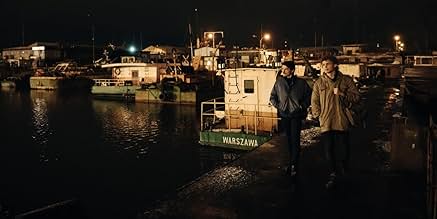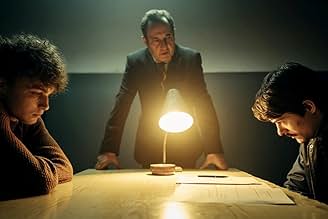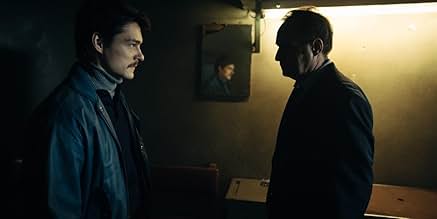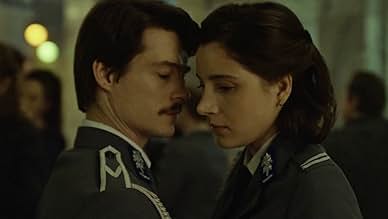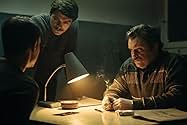ÉVALUATION IMDb
6,8/10
4,8 k
MA NOTE
Ajouter une intrigue dans votre languePoland, 1985: Not satisfied with the result of a murder investigation, a young officer in communist Warsaw sets out on his own to discover the truth.Poland, 1985: Not satisfied with the result of a murder investigation, a young officer in communist Warsaw sets out on his own to discover the truth.Poland, 1985: Not satisfied with the result of a murder investigation, a young officer in communist Warsaw sets out on his own to discover the truth.
- Prix
- 4 victoires et 3 nominations au total
Avis en vedette
Summary
What appeared to be a Polish version of Cruising at the beginning is definitely not. It is a successful neo noir, controversial due to its subject matter for a Polish fiction, which recounts a police investigation into a period during which thousands of homosexuals and heterosexuals related to them were persecuted, mistreated, booked and sometimes compulsively detained. This is another of those films that strongly recreates that oppressive period climate, but also everyday "behind the iron curtain".
Review:
During the 1980s, while the Polish police and secret service carried out Operation or Action Jacinto, the young detective Robert (Tomasz Zietek, with an air of Polish Alain Delon) faces the investigation, as an undercover agent, of a murder in the underground gay community in Warsaw. Despite the rapid "solving" of the case under pressure from the SB (Polish intelligence and secret police, in which his own father is a colonel), Robert insists on carrying out the investigation and will do so for more than one reason.
What appeared to be a Polish version of Cruising at the beginning, is definitely not. Piotr Domalewski's film is a neo noir in which Robert's research poses challenges to the system that are later enhanced by more personal ones that are added. It is controversial for a Polish fiction to relate a police investigation referring to a period during which thousands of homosexuals were registered in a compulsive way from raids in a framework of denunciation so expensive to Stalinism and police brutality and that gave rise to all kinds of extortion. In other words, Operation Jacinto appears as the background of the investigation and not as the plot axis of the film. Perhaps for this reason, his denunciation is more powerful since he paints a whole period painting.
This is another of those films that strongly recreates that period climate "behind the iron curtain." The staging uses a photograph and a successful eighties soundtrack and the police and personal intrigues of the detective (although they contain some predictable elements) are very well concocted and carried out, supported by the acting solvency to which we are accustomed to Polish fictions.
What appeared to be a Polish version of Cruising at the beginning is definitely not. It is a successful neo noir, controversial due to its subject matter for a Polish fiction, which recounts a police investigation into a period during which thousands of homosexuals and heterosexuals related to them were persecuted, mistreated, booked and sometimes compulsively detained. This is another of those films that strongly recreates that oppressive period climate, but also everyday "behind the iron curtain".
Review:
During the 1980s, while the Polish police and secret service carried out Operation or Action Jacinto, the young detective Robert (Tomasz Zietek, with an air of Polish Alain Delon) faces the investigation, as an undercover agent, of a murder in the underground gay community in Warsaw. Despite the rapid "solving" of the case under pressure from the SB (Polish intelligence and secret police, in which his own father is a colonel), Robert insists on carrying out the investigation and will do so for more than one reason.
What appeared to be a Polish version of Cruising at the beginning, is definitely not. Piotr Domalewski's film is a neo noir in which Robert's research poses challenges to the system that are later enhanced by more personal ones that are added. It is controversial for a Polish fiction to relate a police investigation referring to a period during which thousands of homosexuals were registered in a compulsive way from raids in a framework of denunciation so expensive to Stalinism and police brutality and that gave rise to all kinds of extortion. In other words, Operation Jacinto appears as the background of the investigation and not as the plot axis of the film. Perhaps for this reason, his denunciation is more powerful since he paints a whole period painting.
This is another of those films that strongly recreates that period climate "behind the iron curtain." The staging uses a photograph and a successful eighties soundtrack and the police and personal intrigues of the detective (although they contain some predictable elements) are very well concocted and carried out, supported by the acting solvency to which we are accustomed to Polish fictions.
I remember meeting some Polish guys in London by chance in the very early 70s. I was astonished and asked them how they had got out. They laughed and told me that Poland had liberal policies for allowing tourists to the West. I think that chance meeting closed my eyes to the true horror of the Stalinist state that Poland really was and which is portrayed unflinchingly in the film.
Suspects get beaten up, arrested wrongfully, forced to confess. But lets not go to far overboard on this. It was happening in France, the US, the UK too. As in the film, public lavatories were raided by cops in the UK as well. Lives were ruined.
Robert, the son of a Secret Service colonel, has a sense of morality and open mindedness. When he and his colleague are tasked with finding the murderer of a prominent closeted gay man, he thinks naively that they will be properly investigating. He should have realised that by he and his partner being given the case instead of the murder squad that there were plots within plots.
Unsatisfied by the culmination of the case, he strikes out on his own to find a web of corruption that extends right to the top. During this personal inquiry, he discovers himself and his true desires.
Desperate danger arrives for him and the new friends he has made and he makes his personal, political, moral and professional choice during an award ceremony for having "solved" the original murder. In the final scene, we are left hoping against hope that he can keep the promise that he made to Arek.
The period details of this film were perfect. I loved the music being played in the bars and formal dinners, so incredibly old-fashioned compared to the West. The clothes and the filming locations were perfect. A true-to-life detail was that everyone smoked. Virtually every scene had people lighting up.
Tension was held through the whole of the running time of one hour and fifty minutes. There wasn't a minute I was tempted to look at my watch or phone. I highly recommend this film.
Suspects get beaten up, arrested wrongfully, forced to confess. But lets not go to far overboard on this. It was happening in France, the US, the UK too. As in the film, public lavatories were raided by cops in the UK as well. Lives were ruined.
Robert, the son of a Secret Service colonel, has a sense of morality and open mindedness. When he and his colleague are tasked with finding the murderer of a prominent closeted gay man, he thinks naively that they will be properly investigating. He should have realised that by he and his partner being given the case instead of the murder squad that there were plots within plots.
Unsatisfied by the culmination of the case, he strikes out on his own to find a web of corruption that extends right to the top. During this personal inquiry, he discovers himself and his true desires.
Desperate danger arrives for him and the new friends he has made and he makes his personal, political, moral and professional choice during an award ceremony for having "solved" the original murder. In the final scene, we are left hoping against hope that he can keep the promise that he made to Arek.
The period details of this film were perfect. I loved the music being played in the bars and formal dinners, so incredibly old-fashioned compared to the West. The clothes and the filming locations were perfect. A true-to-life detail was that everyone smoked. Virtually every scene had people lighting up.
Tension was held through the whole of the running time of one hour and fifty minutes. There wasn't a minute I was tempted to look at my watch or phone. I highly recommend this film.
This is a really tight fact-based drama based on a true chapter from the ignominious past of communist Poland. Beautifully photographed and set in a bleak Warsaw winter. Good performances all around and a compelling narrative make this stand above gay persecution tropes that often accompany similarly themed motion pictures.
At the first sigh, a film about Polish pink files under Comunist regime. In essence, just an inspired portrait of a dictatorship. Admirable work of Tomasz Zietek, precise and sublle exploration of a dark universe, good game of apparences, mix of justice spirit and love .
A well crafted film about idealism and truth, proposing not exactly, not only, a requisitorium against homophobia but a beautiful work about live in truth.
A well crafted film about idealism and truth, proposing not exactly, not only, a requisitorium against homophobia but a beautiful work about live in truth.
This ain't your feel-good Gay movie. This is one of our stories about our tough history. It's about a society who is locked in homophobia, to the point of seeking out the queers to criminalize them. It's well-done drama, based on the the Hyacinth Operation in Communist Poland in the 80s, rooting out queers to rat on other queers, etc.
There are some lighter parts, such as a glimpse of a clandestine queer party full of silly antics. And you do get to experience the some of queer "family" support through horrendous times. And a little bit of sex.
Definitely worth a watch. It's part of our history. (Unfortunately, it's also part of our present, given Poland's continued institutionalized homophobia).
Please watch it. It's entertaining. And it's important!
There are some lighter parts, such as a glimpse of a clandestine queer party full of silly antics. And you do get to experience the some of queer "family" support through horrendous times. And a little bit of sex.
Definitely worth a watch. It's part of our history. (Unfortunately, it's also part of our present, given Poland's continued institutionalized homophobia).
Please watch it. It's entertaining. And it's important!
Le saviez-vous
- Bandes originalesVoyage
by Brian Bennett
Meilleurs choix
Connectez-vous pour évaluer et surveiller les recommandations personnalisées
- How long is Operation Hyacinth?Propulsé par Alexa
Détails
- Durée1 heure 52 minutes
- Couleur
- Mixage
- Rapport de forme
- 2.35 : 1
Contribuer à cette page
Suggérer une modification ou ajouter du contenu manquant


